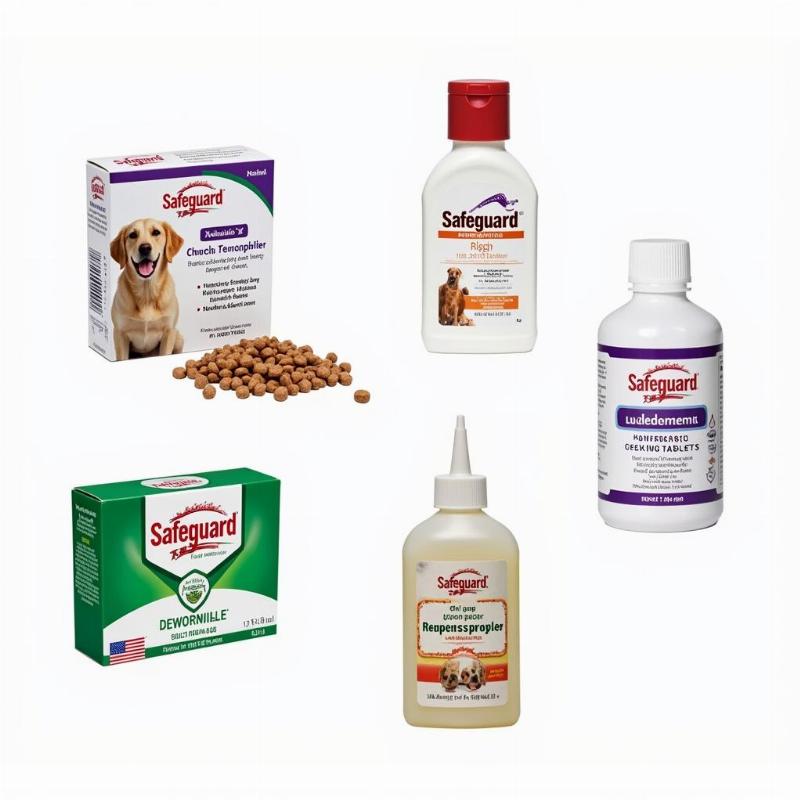Safeguard dewormer for dogs dosage is a crucial aspect of responsible pet ownership. Understanding the correct dosage and administration of this common dewormer is essential for effectively treating intestinal parasites and maintaining your dog’s health. This guide provides detailed information on Safeguard dewormer, its usage, dosage guidelines, potential side effects, and important considerations for various situations, ensuring you can confidently administer this medication to your canine companion.
Understanding Safeguard Dewormer for Dogs
Safeguard dewormer for dogs contains fenbendazole, a broad-spectrum anthelmintic effective against common intestinal parasites like roundworms, hookworms, whipworms, and some types of tapeworms. It works by disrupting the parasite’s metabolism, leading to its elimination from your dog’s system. Safeguard is available in various forms, including granules, chewable tablets, and liquid suspensions, catering to different dog preferences.
 Safeguard Dewormer in Various Forms
Safeguard Dewormer in Various Forms
Safeguard Dewormer for Dogs Dosage Guidelines
The general dosage guideline for Safeguard is 50 mg of fenbendazole per kg of body weight, administered orally once daily for three consecutive days. However, it’s crucial to always consult your veterinarian to confirm the appropriate dosage for your dog’s specific situation. Factors such as age, breed, health condition, and the type of parasitic infestation can influence the recommended dosage. Never exceed the prescribed dosage without veterinary guidance, as this could lead to adverse effects.
Calculating the Correct Dosage
Accurately weighing your dog is paramount to determining the right dosage. If your dog’s weight fluctuates, seek your vet’s advice on adjusting the dosage accordingly. For puppies and small dogs, using a kitchen scale can be helpful for precise measurement. Your veterinarian can provide specific instructions for administering the dewormer to very young or toy breed dogs.
Potential Side Effects of Safeguard Dewormer
Safeguard is generally considered safe for dogs, but some mild side effects might occur. These can include vomiting, diarrhea, and loss of appetite. If you observe any unusual symptoms or if the side effects persist, consult your veterinarian immediately. In rare cases, allergic reactions can occur, manifesting as skin rashes, swelling, or difficulty breathing. Seek immediate veterinary attention if your dog exhibits any signs of an allergic reaction.
Deworming Pregnant Dogs with Safeguard
Deworming pregnant dogs is a delicate matter. While Safeguard is generally considered safe during pregnancy, it’s crucial to consult your veterinarian before administering it to a pregnant or lactating dog. Your veterinarian can assess the risks and benefits and recommend the most appropriate course of action for your dog’s individual needs. They might suggest a modified dosage or an alternative dewormer depending on the specific circumstances. can u deworm a pregnant dog
Where to Buy Safeguard Dewormer for Dogs
Safeguard dewormer is readily available at most pet stores, veterinary clinics, and online retailers. Ensure you purchase the product from a reputable source to guarantee its authenticity and quality. where can i buy dewormer for dogs offers a wide range of deworming products. Be wary of counterfeit products, as they may not contain the correct ingredients or dosage, potentially harming your dog.
Conclusion
Administering the correct safeguard dewormer for dogs dosage is essential for protecting your dog from harmful intestinal parasites. Always consult your veterinarian to determine the appropriate dosage and address any concerns you may have. Regular deworming, combined with good hygiene practices, will help keep your furry friend healthy and parasite-free. safeguard dewormer for dogs dosage provides valuable resources on dog health and wellness. Remember, responsible pet ownership includes proactive parasite prevention. all in one dewormer for dogs
FAQ
-
How often should I deworm my dog with Safeguard? This depends on your dog’s lifestyle, age, and risk factors. Consult your veterinarian for a personalized deworming schedule.
-
What if my dog vomits after taking Safeguard? Contact your veterinarian for advice. They may recommend re-administering the dose or suggest an alternative approach.
-
Can I use Safeguard dewormer on puppies? Yes, but it’s crucial to consult your veterinarian for the correct dosage and administration instructions for puppies.
-
Can Safeguard treat all types of worms in dogs? Safeguard is effective against many common intestinal parasites, but not all. Your vet can determine the specific type of worm infesting your dog and recommend the most appropriate treatment.
-
What if I miss a dose of Safeguard? Administer the missed dose as soon as you remember, and then continue with the regular schedule. If it’s almost time for the next dose, skip the missed dose and resume the regular schedule. Do not double dose.
-
Are there any dietary restrictions while using Safeguard? Generally, no specific dietary restrictions are necessary. However, always consult your vet for individual advice.
-
Can I use Safeguard with other medications? Inform your veterinarian about all other medications your dog is currently taking to avoid potential drug interactions.
Beautdogs.us is your premier destination for all things dog-related in the US. We offer expert advice on dog breeds, care, and product recommendations. Whether you’re a first-time dog owner or a seasoned enthusiast, Beautdogs.us provides a wealth of trusted resources to support your journey with your beloved canine companion. For any inquiries, contact us at [email protected] or call us at +1 501-555-7529. Visit Beautdogs.us today for comprehensive information and guidance on all aspects of dog ownership.